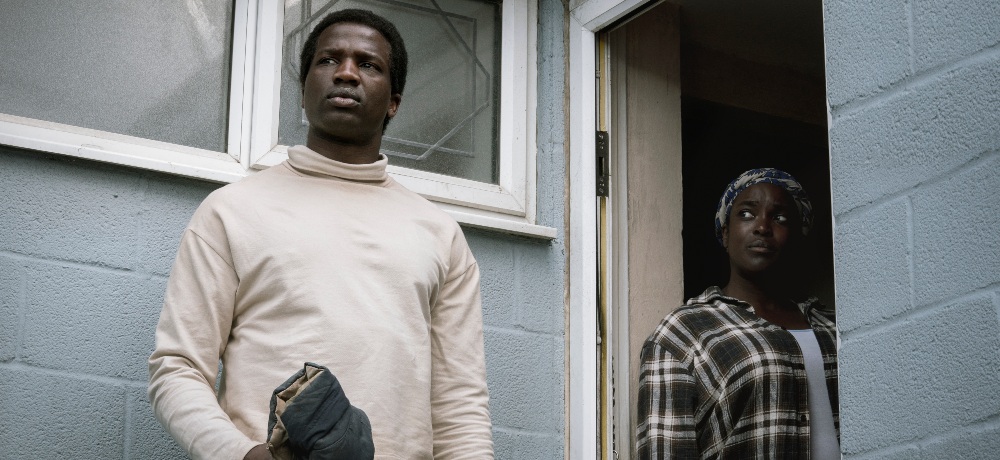


After enjoying its world premiere at the 2020 Sundance Film Festival earlier this year, Remi Weekes’ His House is set to premiere on Friday, October 30th exclusively on Netflix. Earlier this week, Daily Dead had the opportunity to speak with Weekes about his feature film debut, and he discussed blending real-life trauma and genre tropes for His House, as well as the importance of having good characters in horror, and more.
Be sure to check out His House when it hits Netflix tomorrow.
Congratulations on His House, Remi. Can you discuss making the transition from shorts to features for this project? And was there something about this story in particular where you were like, “Yes, this is it. This is my first film.”
Remi Weekes: I've been wanting to make films ever since I was a young child. I went to film school and I was making short films and then I moved into commercials to make ends meet. So, it was a gradual thing, but during all that time, I was writing. I don't think I was that great at it, so I really had to practice and work at it. Eventually, I did a short film called Tickle Monster, which is another horror film, and after writing that, I wrote His House.
I'm here in the States, but I think we have similar issues when it comes to refugees and the idea of otherism. I really appreciated how this opened me up to perspectives that I didn't know a whole lot about. What was the research process like for you with this story and utilizing this concept as a backdrop for the horror that these characters face?
Remi Weekes: So, when we were developing the script, we did a lot of research. One thing I noticed when researching was that as an asylum seeker, the government will give you accommodations. It fulfills this very draconian rule, and you can't just leave the house and you have to stay put. You can't get a job, you have to go weekly to check in, where it's almost like you’re being punished. And for many asylum seekers in this country, that can lead to this feeling of re-traumatization, because they're forced to be in this place and unable to take the necessary next steps to move into this new life. For me, as someone looking at it from a horror perspective, specifically the haunted house genre, it just seemed like a very interesting way to explore those limitations that come from this place where you're forced to reckon with your past.
You just mentioned those limitations and how you parlayed them into the horror that's inside of this house, and ultimately, the horror that's inside the psyches of these characters. Beyond that, you also have to visually manifest these things, making them these representations for what they’re facing while trying to fit into this new world. Can you discuss how you approached those elements?
Remi Weekes: With the haunted house aspects of the film, it was really important to me to find the ways to use all those genre elements, but also to reflect upon the grief and the characters and their trauma. The easier way to explain it is that I just wanted to find really fun, spooky ways to scare the audience. Part of me wishes that I had given myself an easy job where I could just scare the audience for an hour. But one of the hardest things about this movie for me was that I had to make sure that the scares were always relevant to the characters and to the story and the storytelling, where the scares are revealing something about where the character is in that moment. That was really challenging for me.
In regard to these characters, they really are the heart of this story and I really enjoyed both Ṣọpẹ́ [Dìrísù]’s and Wunmi [Mosaku]’s performances in this. Can you talk about working with the actors on their performances here?
Remi Weekes: I have always believed that you can't really make a movie scary if you don't care about the characters. I've seen a lot of films and the ones that, for me, fail are the ones where you want the villains to get these characters in the end, because I'm sick of them. So, when I was making this film, it was really important to me that the audience cares about these characters. Part of that is willing to show favor to the actors and allowing them to find the heart of their characters. When we were on set, they both would come up with new lines, which added a bit of humanity to their performances, which I thought was excellent. It was very collaborative.
You also had Javier Botet in this, who is one of the premier physical actors working today. Was it cool to work with him on His House?
Remi Weekes: He plays our creature, and yeah, I loved working with him. He takes his performances very seriously, but he really has fun with it, too. He's such a pro and he was helping all of us out on set, especially during the ending, because we had to make sure that had to be blocked out so well. But there he was, in his full head-to-toe suit, with these fake teeth and fake eyes and he can barely see anything. But he's still there helping us out, showing us where to place everything so we got the most out of those moments. And when we’d say, “Cut,” he was just ready to go all over again. He was really great.
[Photo Credit: Above photo by Aidan Monaghan/NETFLIX © 2020]